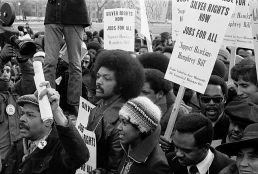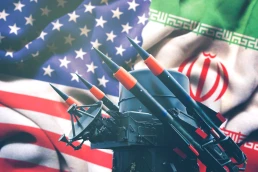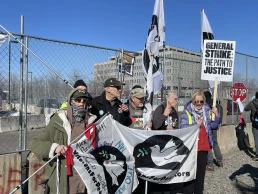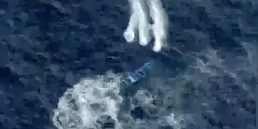A nuclear winter would be a global climate catastrophe. But climate change itself also makes nuclear war more likely.
By Ryan Black
Climate change and nuclear weapons are inherently connected. Even a “limited” nuclear war would be catastrophic for the Earth’s climate.
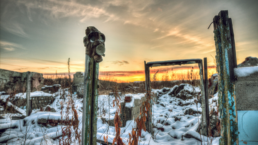
For example, computer models have shown what a “limited” nuclear war between India and Pakistan could lead to – a war in which less than 3 percent of the world’s nuclear weapons would potentially be detonated. In those models, the average global temperature would decrease by up to 7 degrees centigrade, precipitation would decrease by up to 40 percent, and sunlight would decrease by up to 30 percent.
Beyond the millions or tens of millions directly killed by the bombs, the smoke generated by subsequent firestorms would lead to a massive decline in agricultural production, which would lead to the starvation of up to an estimated 2 billion people.
To make things worse, the smoke and soot would lead to global cooling and ozone depletion that would allow more ultraviolet radiation to reach Earth’s surface.
Nuclear Winter
These effects in total are part of what scientists call “nuclear winter” – global cooling resulting from smoke and ash blocking the sun. Climate models have projected this since 1983. Essentially, a nuclear war anywhere will lead to a nuclear winter everywhere.
Here’s the scariest quote from the 1983 study:
When combined with the prompt destruction from nuclear blast, fires, and fallout and the later enhancement of solar ultraviolet radiation due to ozone depletion, long-term exposure to cold, dark, and radioactivity could pose a serious threat to human survivors and to other species. … The possibility of the extinction of Homo sapiens cannot be excluded.
And this is just a so-called “limited” nuclear war. A full-scale nuclear war would be even worse for humans and the planet. A 2019 study showed that Iowa, for example, would experience temperatures below freezing continuously for 730 days in the event of a nuclear war between the U.S. and Russia. Billions of people would die from famine in the aftermath. Food production would decrease 90%. Global fish stocks would be decimated. The effects of a large-scale nuclear war on the environment and the climate mean that almost everyone on the planet would starve to death, if they weren’t killed in the initial blasts.
But it’s not just that a nuclear war would lead to a worldwide environmental and climate disaster – it works the other way, too. Climate change is already making the possibility of nuclear war, and nuclear winter, more likely.
Climate Change Leads To Increased Tension Between Nuclear-Armed Countries
Researchers have said that extreme droughts in Syria led to a mass migration of people to urban areas, which led to social issues which brought about the uprising there that eventually led to the U.S. and Russia both intervening there. That conflict, spurred on by climate issues, increased tensions between the world’s two nuclear superpowers.
In a 2019 paper, researchers found that intensifying climate change is likely to increase the risk of future organized armed conflicts, estimating that, “3–20% of conflict risk over the past century has been influenced by climate variability or change.”
This is why climate activists, who are doing amazing work and bring a ton of energy, skill, and passion to their activism, should consider becoming nuclear disarmament activists too. Because nuclear winter is climate change in fast-forward. It’s everything climate activists want to avoid, but it could happen in an instant.
Ryan Black is a political activist and multimedia content creator. He is an organizer at RootsAction.org and ProgressiveHub.net. Find him on Twitter at @RBpolitic
Recent Posts
The Left Owes a Lot to Jesse Jackson
February 19, 2026
Take Action Now As a movement builder, spokesperson, and candidate for the presidency, Jesse Jackson’s accomplishments were massive. He was one of…
Trita Parsi Warns U.S. & Iran Have Incentives to Escalate Conflict
February 19, 2026
Take Action Now “We have a very dangerous situation, because both sides actually believe that a short, intense war may improve their…
Minneapolis: Organizing for the Protection of the Community
February 18, 2026
Take Action Now In speaking with residents in several parts of Minneapolis, beautiful stories of organizing on a block-by-block level emergedBy…
U.S. Sent a Rescue Plane For Boat Strike Survivors. It Took 45 Hours To Arrive.
February 17, 2026
Take Action Now In seas that could kill a person within an hour, it took nearly two days for a rescue plane to arrive.By Tomi McCluskey and Nick…

